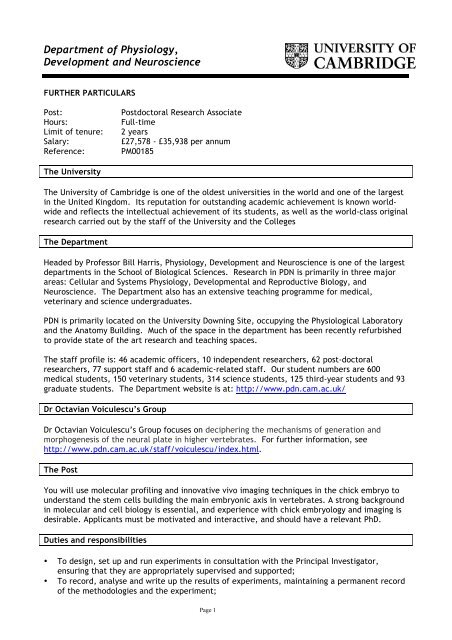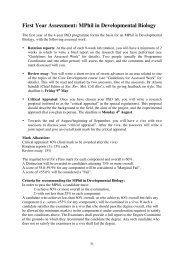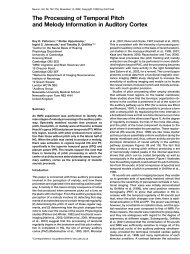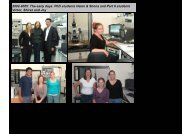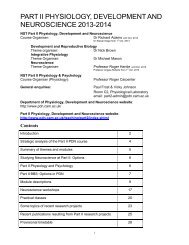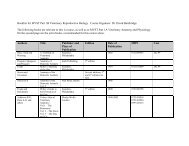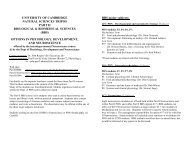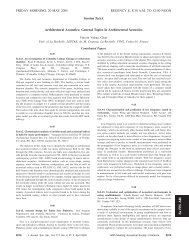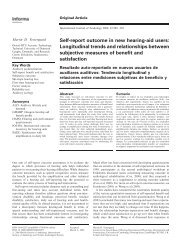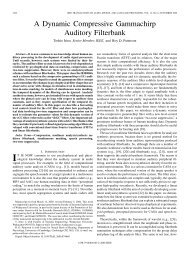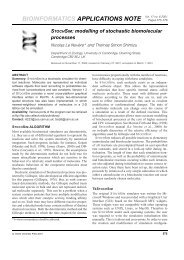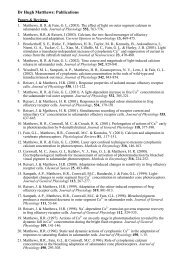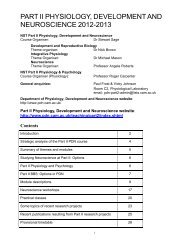PM00185_Further particulars - Department of Physiology ...
PM00185_Further particulars - Department of Physiology ...
PM00185_Further particulars - Department of Physiology ...
You also want an ePaper? Increase the reach of your titles
YUMPU automatically turns print PDFs into web optimized ePapers that Google loves.
<strong>Department</strong> <strong>of</strong> <strong>Physiology</strong>,<br />
Development and Neuroscience<br />
FURTHER PARTICULARS<br />
Post:<br />
Hours:<br />
Limit <strong>of</strong> tenure:<br />
Salary:<br />
Reference:<br />
Postdoctoral Research Associate<br />
Full-time<br />
2 years<br />
£27,578 - £35,938 per annum<br />
<strong>PM00185</strong><br />
The University<br />
The University <strong>of</strong> Cambridge is one <strong>of</strong> the oldest universities in the world and one <strong>of</strong> the largest<br />
in the United Kingdom. Its reputation for outstanding academic achievement is known worldwide<br />
and reflects the intellectual achievement <strong>of</strong> its students, as well as the world-class original<br />
research carried out by the staff <strong>of</strong> the University and the Colleges<br />
The <strong>Department</strong><br />
Headed by Pr<strong>of</strong>essor Bill Harris, <strong>Physiology</strong>, Development and Neuroscience is one <strong>of</strong> the largest<br />
departments in the School <strong>of</strong> Biological Sciences. Research in PDN is primarily in three major<br />
areas: Cellular and Systems <strong>Physiology</strong>, Developmental and Reproductive Biology, and<br />
Neuroscience. The <strong>Department</strong> also has an extensive teaching programme for medical,<br />
veterinary and science undergraduates.<br />
PDN is primarily located on the University Downing Site, occupying the Physiological Laboratory<br />
and the Anatomy Building. Much <strong>of</strong> the space in the department has been recently refurbished<br />
to provide state <strong>of</strong> the art research and teaching spaces.<br />
The staff pr<strong>of</strong>ile is: 46 academic <strong>of</strong>ficers, 10 independent researchers, 62 post-doctoral<br />
researchers, 77 support staff and 6 academic-related staff. Our student numbers are 600<br />
medical students, 150 veterinary students, 314 science students, 125 third-year students and 93<br />
graduate students. The <strong>Department</strong> website is at: http://www.pdn.cam.ac.uk/<br />
Dr Octavian Voiculescu’s Group<br />
Dr Octavian Voiculescu’s Group focuses on deciphering the mechanisms <strong>of</strong> generation and<br />
morphogenesis <strong>of</strong> the neural plate in higher vertebrates. For further information, see<br />
http://www.pdn.cam.ac.uk/staff/voiculescu/index.html.<br />
The Post<br />
You will use molecular pr<strong>of</strong>iling and innovative vivo imaging techniques in the chick embryo to<br />
understand the stem cells building the main embryonic axis in vertebrates. A strong background<br />
in molecular and cell biology is essential, and experience with chick embryology and imaging is<br />
desirable. Applicants must be motivated and interactive, and should have a relevant PhD.<br />
Duties and responsibilities<br />
• To design, set up and run experiments in consultation with the Principal Investigator,<br />
ensuring that they are appropriately supervised and supported;<br />
• To record, analyse and write up the results <strong>of</strong> experiments, maintaining a permanent record<br />
<strong>of</strong> the methodologies and the experiment;<br />
Page 1
• To prepare and present findings <strong>of</strong> research activity to colleagues;<br />
• To contribute to the writing, submission and revision <strong>of</strong> papers to be submitted to<br />
appropriate peer reviewed journals, collaborating with others as appropriate;<br />
• To contribute to the overall activities <strong>of</strong> the research group and the <strong>Department</strong> as<br />
appropriate;<br />
• To contribute to the induction and direction <strong>of</strong> other research staff and students if so<br />
requested by the PI.<br />
Person specification<br />
Essential<br />
• PhD in a relevant subject area;<br />
• Proven skills in molecular biology and developmental biology;<br />
• Knowledge <strong>of</strong> a range <strong>of</strong> relevant research techniques and scientific literature;<br />
• Proven ability to analyse and write up data;<br />
• Ability to participate in collaborations and meetings with consortium colleagues;<br />
• Effective written and verbal communication skills;<br />
• Experience <strong>of</strong> working in a research environment.<br />
Desirable<br />
• Skills in chick embryology, culture techniques and imaging;<br />
• Ability to present complex information effectively to a range <strong>of</strong> audiences;<br />
How to apply<br />
Candidates should submit a CHRIS/6 application form (parts 1 and 3 only) and CV to Octavian<br />
Voiculescu (ogv20@cam.ac.uk ), Anatomy Building, <strong>Department</strong> <strong>of</strong> <strong>Physiology</strong>, Development and<br />
Neuroscience, Downing Site, Cambridge, CB2 3DY by 2 May 2012.<br />
Terms and conditions <strong>of</strong> employment<br />
The appointment will be to the post <strong>of</strong> Research Associate, grade 7. Salary, within the range <strong>of</strong><br />
£27,578 - £35,938 per annum, is determinable on the basis <strong>of</strong> qualifications and experience.<br />
The leave year runs from 1 October to 30 September and the annual leave entitlement is 33<br />
working days plus 8 Bank Holidays. Leave entitlement would be calculated pro-rata if work<br />
started after the beginning <strong>of</strong> the leave year.<br />
<strong>Further</strong> information about working at Cambridge and the additional benefits provided, can be<br />
found under Cambridge Life on www.cam.ac.uk/jobs/<br />
Equal Opportunities Information<br />
The University <strong>of</strong> Cambridge appoints solely on merit. No applicant for an appointment in the<br />
University, or member <strong>of</strong> staff once appointed, will be treated less favourably than another on<br />
the grounds <strong>of</strong> sex (including gender reassignment), marital or parental status, race, ethnic or<br />
national origin, colour, disability (including HIV status), sexual orientation, religion, age or<br />
socio-economic factors.<br />
Information if you have a Disability<br />
The University welcomes applications from individuals with disabilities. Our recruitment and<br />
selection procedures follow best practice and comply with disability legislation.<br />
Page 2
The University is committed to ensuring that applicants with disabilities receive fair treatment<br />
throughout the recruitment process. Adjustments will be made, wherever reasonable to do so,<br />
to enable applicants to compete to the best <strong>of</strong> their ability and, if successful, to assist them<br />
during employment. We encourage applicants to declare their disabilities in order that any<br />
special arrangements, particularly for the selection process, can be accommodated. Applicants<br />
or employees can declare a disability at any time.<br />
Applicants wishing to discuss with or inform the University <strong>of</strong> any special arrangements<br />
connected with their disability can, at any point in the recruitment process, contact Elaine<br />
Murdie on 01223 333769.<br />
Page 3


